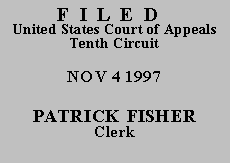

| UNITED STATES OF AMERICA,
Plaintiff-Appellee, v. GILBERT ESPINOZA-SAENZ, Defendant-Appellant. |
|
Defendant appeals the district court's discretionary denial of a downward departure from the guideline mandated sentence to home detention due to his physical condition. See U.S.S.G. § 5H1.4. Defendant's counsel has filed a brief pursuant to Anders v. California, 386 U.S. 738 (1967), in which he states the appeal is frivolous because this court lacks jurisdiction to decide an appeal from the district court's discretionary refusal to grant a downward departure. Counsel has also filed a motion to withdraw pursuant to Anders and 10th Cir. R. 46.4.2.
Defendant was provided with a copy of counsel's Anders brief and allowed "to raise any points that he chooses." Anders, 386 U.S. at 744. He alleges, without providing support, that this court has jurisdiction to decide whether a district court's discretionary denial of a motion for downward departure was proper. Also, he argues that his counsel was ineffective because (1) he instructed counsel to request downward departure of his guideline sentence, not home detention; (2) counsel should have objected to indications by the government that he had other charges pending against him, he was an escapee from the Bureau of Prisons, and he threatened the cooperating witness or members of the family of the cooperating witness; and (3) his counsel did not properly argue his physical condition, criminal history, or the facts of the case.
Unless the district court was unaware of its authority to depart downward from the guidelines, the court's failure to depart is unreviewable on appeal.(1) See United States v. Sanders, 18 F.3d 1488, 1490 (10th Cir. 1994). Because the district court judge plainly was aware of his authority to grant a downward departure and refused to do so, see III R. at 11, his decision must stand. We lack jurisdiction to review the refusal to depart. See Sanders, 18 F.3d at 1491.
We conclude defendant's ineffective assistance of counsel claims should be brought in collateral proceedings rather than on this direct appeal. See United States v. Galloway, 56 F.3d 1239, 1240 (10th Cir. 1995) (en banc). "Such claims brought on direct appeal are presumptively dismissable . . . ." Id.
Accordingly, the appeal is DISMISSED. Counsel's motion to withdraw is GRANTED. The mandate shall issue forthwith.
Entered for the Court
Senior Circuit Judge
*. This order and judgment is not binding precedent, except under the doctrines of law of the case, res judicata, and collateral estoppel. The court generally disfavors the citation of orders and judgments; nevertheless, an order and judgment may be cited under the terms and conditions of 10th Cir. R. 36.3.
1. We also may review sentences that are illegal or the result of incorrect applications of the guidelines. See United States v. Belt, 89 F.3d 710, 714 (10th Cir. 1996). Neither of these jurisdictional bases is applicable here, however.